语文出版社中职教材英语基础模块下册U
语文版中职英语(基础模块 下册)Unit 3《English Study》ppt课件1

5.持续不断、坚持做某事
※keep on doing sth
他持续不断的做了2个小时的作业。 He kept keepon on doing homework for 2 hours.
6.把……付诸实践
※put…… into practice
我们得把我们的想法付诸实践。 We should put our ideas into practice.
7.充满信心
※with confidence
我们应该充满信心的面对生活。 We should face the life with confidence.
※recommend sth. to sb. ※admire sb. for sth
※graduate from ※keep on doing sth
※have a chance to do sth 有机会去做某事 ※graduate from
毕业于
How can they speak English so well?
There is nothing secret, They just keep 秘密 继续 坚持 on learning by themselves and put what
“Yes, please!” ”come on and have a look!”
”10 percent discount, ok? You can’t 折扣 find百分之
更好 or cheaper ones.” The 女售货员 better salesgirls in Beijing’s Xiushui Market are giving the
1.把某物推荐给某人
2.因某事而钦佩某人 3.有机会去做某事
语文出版社中职教材英语基础模块下册Unit 5译文
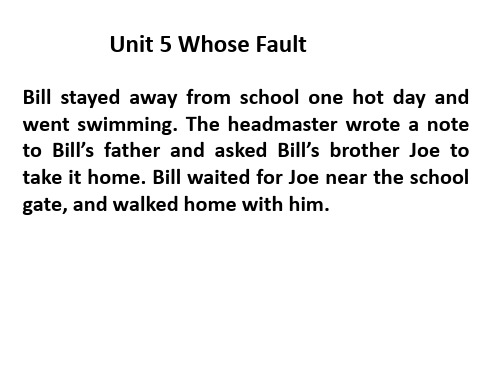
Unit 5 Whose Fault
Bill stayed away from school one hot day and went swimming. The headmaster wrote a note to Bill’s father and asked Bill’s brother Joe to take it home. Bill waited for Joe near the school gate, and walked home with him.
突然,乔从衣袋里把便条掏出来扔 掉了。
Joe kept silent but was greatly troubled. Joe suddenly took the note out of his pocket and threw it away. It flew up with the wind and came to rest on a very high branch of a big old tree. Bill saw it, but said nothing.
“Look here, Joe!” said Bill. “If you give it to Father, I’ll have to run away from home again. If you don’t, I’ll go to school every day. I’ll never fight or tell lies and I love you, Joe.” Bill threatened and pleaded.
“ 听我说!乔,”比尔说,
“Look here, Joe!” said Bill. “If you give it to Father, I’ll have to run away from home again. If you don’t, I’ll go to school every day. I’ll never fight or tell lies and I love you, Joe.” Bill threatened and pleaded.
语文出版社中职教材英语基础模块下册Unit-6课件知识讲稿
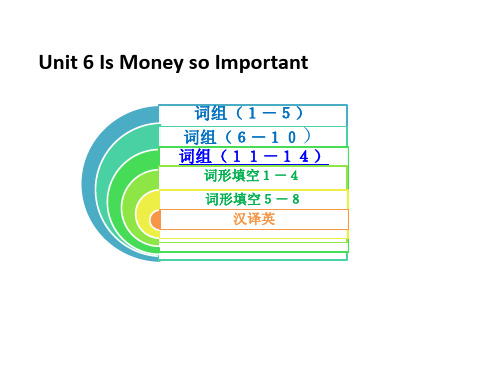
This reminds me of Italy when it was still a developing country. Young people there didn’t just want to wear jeans; they wanted to wear Levi’s. And sports shoes were not shoes unless they were Nike or Reebok.
这位父亲说他的儿子不喜欢他, 因为他赚不了很多的钱。
A newspaper published a letter from a father. The father said that his son disliked him because he didn’t earn much money. The son felt unhappy when he saw his classmates wearing famous brand clothes or being driven to school in a car.
报纸上刊登了一位父亲写的信。
A newspaper published a letter from a father. The father said that his son disliked him because he didn’t earn much money. The son felt unhappy when he saw his classmates wearing famous brand clothes or being driven to school in a car.
每当他儿子看见同学穿着名牌
衣服或是坐私车上学时, 就 觉得不高兴。
This reminds me of Italy when it was still a developing country. Young people there didn’t just want to wear jeans; they wanted to wear Levi’s. And sports shoes were not shoes unless they were Nike or Reebok.
语文版中职英语(基础模块-下册)Unit-1《Travel》2.ppt

It is the world's sixth-largest country by total area. Neighbouring countries include Indonesia, East Timor, and Papua New Guinea to the north; the Solomon Islands, Vanuatu, and New Caledonia to the north-east; and New Zealand to the southeast.
Tanzania
The United Republic of Tanzania: is a country in East Africa bordered by Kenya and Uganda to the north, Rwanda, Burundi, and the Democratic Republic of the Congo to the west, and Zambia, Malawi, and Mozambique to the south. The country's eastern borders lie on the Indian Ocean.
Unit One Travel
• Teaching contents:
• Unit One Travel • Teaching aims:
• Know about the cultural differences and try to avoid cultural taboos.
Teaching methods: Lecture; discussion Teaching procedures: I. Getting Ready: Discussion 1. Do you know of any cultural
语文版中职英语基础模块下册Unit1Travel

TEACHING PLANUnit 1 How often do you exercise?Ⅰ. Knowledge Objectives1. Master how to use adverbs of frequency properly (always, usually, often, sometimes,hardly ever, never, how often, once, twice, three times a week, every day).2. Master how to describe the arrangements of activities in the spare time。
3. Master how to describe the eating hobbits and how to keep healthy (milk, junk food, health,unhealthy).Ⅱ. Ability Objectives1. Improve the students’ skills of speaking, reading, listening and writing.2. Train the students to formulate adverbs of frequency accurately by using some effectivelearning methods and information.Ⅲ. Moral ObjectivesEnlighten the students to open their horizon, arrange their daily life efficiently, and have a healthy lifestyle.Ⅳ. Difficulties and focus:1.Master the vocabulary.exercise, hardly, ever, once, twice, time, Internet, program, most, no, result, active, as for, about, coffee, chocolate, drink, health, habit, try, grade, better, same, as, different, difference, maybe, although, for, keep, must2.Master Adverbs of Frequencyalways, usually, often, sometimes, hardly ever, never every day, once a week, twice a month, four times a year3.Master the structures by using Adverbs of FrequencyWhat do you usually do on weekdays? I often go to the movies.How often do you watch TV? I watch TV every day.How often does she/ he eat vegetables? She /He eats them three times a day.How many hours do you sleep every night? I sleep nine hours.:Period 1ContentsLanguage goals Talk about The activities on weekdays and How often you do things.How often do you exercise?Task1: The activities on weekdaysTask2:How to improveEnglish studyTask4:Who is thehealthiest?Task3:My eatinghabitsTarget language What do you usually do on weekends? How often do you watch TV?V ocabulary How often, sometimes, hardly ever, twice, once, time, never, Internet, program Task Survey your friends: The activities on weekdaysWhat do you usually / often / sometimes / hardly ever / never do on weekdays?Teaching Procedures Step1: Lead inShow the students some different activities by asking What do you usually do on weekends during the summer holidays?I often go to the movies. / I sometimes go swimming. / I never go fishing. Step2:Present words and phrases: always, usually, often, sometimes, hardly ever, never…What do you do on weekends?I always / usually/ often/sometimes/hardly ever/never…Step3: Activity 1a-1b1.Make a list of the different weekend activities. 1a2.Play the tape. The Ss listen and write the letters. 1b3.Practice in pairs.Step4: Make a conversationLearn how to express the times. Once, twice, three times, four times How often does he /she do his homework/ surf the internet/…?He /She does his homework/ surfs the internet/… every day/ oncea week/ twice a month/ four times a year/…?Step5: Activity 2a-2b1.Play the tape. The Ss listen and number the activities.2.Listen again. Match the activities with the number of times he doesthem.Step6: Task1 The activities on weekdays1.Read the conversation 2c.2.Make a survey: Ask and answer in pairs, then fill in the chart.Step7: Report and then write them down.Report your and your friend’s activities on the weekdays.Summary and do exercises.Period 2Contents P3LanguagegoalsTalk about how often the students do things at school.Target language How often do you read English books? How often does he /she do home work? All / Most/ some /No students exercise once or twice a week.V ocabulary all…, most…, some…, no…, the result , as for Task How to Improve English StudyTeaching ProceduresA guessing game for activities on weekends.Step2: Ask and answerWhat do you do on weekends?I always / usually/ often/sometimes/hardly ever/never…How often does he / she exercise /…?He / She exercises once or twice a week.Step4: Activity 31.Read and learn the information in the charts carefully.2.learn how to use “ all , most, some, no ”3.Learn the new words : result, as for4.Read the magazine carefully and fill in the blanksStep5: Make a survey1. Survey: Class Activities in groups.2. Make a report according to Activity3.Step6: Task 2Make a survey: How to improve our English?Teacher introduces the activity. How to improve our English? How do we study English well? The students answer the questions freely. Write down the answers in the first row. (Speak English , listen to English , keep a diary, …)1.Group work: Who’s the best English student?2.Interview: Improve English Study by asking How often do you readEnglish books/ sing English songs/watch English programs/listen toEnglish tapes/join the English corner/chat with foreigner…?3.Ask classmates the questions. And write down them in the chart. Step7: Report and write it downThe good habits for English studySummary and do exercisesPeriod 3Contents P4Language goals How often do you eat vegetables? Talk about the eating habits.Target language How often do you exercise? How often do you drink milk? How many hours do you sleep every night?V ocabulary junk, junk food, milk, health, interviewer Task My eating habits.Teaching ProceduresDiscuss: What do you usually eat? What do you usually drink? Do you have a good eating habit? What do you have to eat and drink if you want to keep healthy?The students talk about them freely.Step2: Present words and phrases:1.junk food, milk, healthy, be bad/ good for2.junk food and healthy food3.Have a contest: Find the healthy food and unhealthy foodStep3: Activity 1a-1b1. Match the words with the pictures. 1a2. Practice the conversation in the box. 1bHow often do you eat fruit / vegetables/ junk food ?I eat/don’t eat them every day, because they are good/bad for myhealthy.Step4: Activity 2a-2b1. Play the tape. The Ss listen and circle the answer to each question.2. Play the tape again. The Ss listen and fill in the blanks in the survey.Check the answers in class.Step5: Role Play1. The Ss work in pairs to ask and answer questions about Katrina andBill.2. Describe the activities of Katrina and Bill with your own words.Step6: Task3 My eating habits1.Talk about the eating habits with each other.2.Fill the chart by individual3.Write it down and then do a report to the class according to the chart. Summary and do exercisesPeriod 4Contents P5-6Language goals Talk a bout the healthy lifestyle, and how we keep healthy.Target language How often does she exercise? Every day.She eats vegetables ten or eleven times a week.V ocabulary Habit, a lot of, of course, look after, difference, grade, lifestyle, unhealthy, yuck, althoughTask Who is the healthiestTeaching Procedures1. Do you think you have a healthy lifestyle? Why or why not?The students talk about them freely.2. Ask questions about Katrina’s habit according to 2b.Step2: Activity 3a1.Learn the new words: Habit, a lot of, of course, look after, make adifference, grade, lifestyle, unhealthy, better, although2.Play the tape. The Ss listen and read.3.Answer the questions.4.Explain the language points in 3a.Step3: Activity 3bFill in the blanks in Bill’s letter.Step4: Do exercise:1.Read three passages about each person. Then circle “healthy” or“un healthy”plete the passage according to Chinese.3.Read the last passage and answer the question.Step5: Task 4: How do you keep healthy?A healthy life styleKeep a healthy diet.Exercise every day. (males / females)Sleep well.Step6: Make a survey Who is the healthiest?1.Make a survey by asking the questions.2.Write it down then report it.Summary and do exercises。
中职英语基础模块下Unit 11 Job Hunting 语文出版社
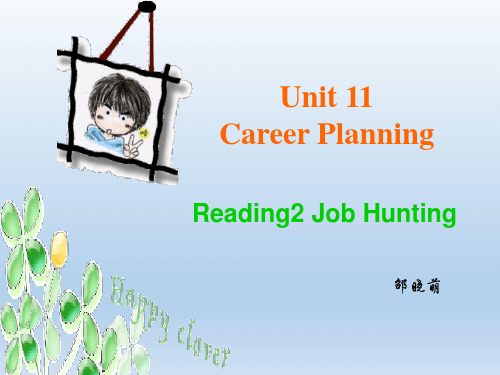
Words and phrases
decide to do sth. 决定做某事
When you have decide to apply for a job…
当你决定申请一份工作时…
I decide to go shopping with my mother.
我决定和我妈妈去购物。
apply for 申请,请求
FWirosrtd, sreaanddtphherfaoslelsowing short passages, then give a suitable ______to each of them.
paragraph 6
BRegadininwg2ithJ…ob Hunting
honors and activities a…grbeeecatousdeoe…mp“loy同er意s w做o…n’”t hire you unless they see you in person.
paragraph 8
UHsoewfutloWworritdesaanredsuPmhrea?ses
Iatgureseua常lly见b短eg语ins归w纳ith a short paragraph that summarizes the education you have received…
How to write a resume?
How many sections does a resume include? bperegpinarwe iftohr=start with 用…开头;
PHaornaegsrtayphis1the most important condition to apply for the work. j简ob历in开te关rvi一ew段通常概述你的学历…
中职英语基础模块下unit全部教案
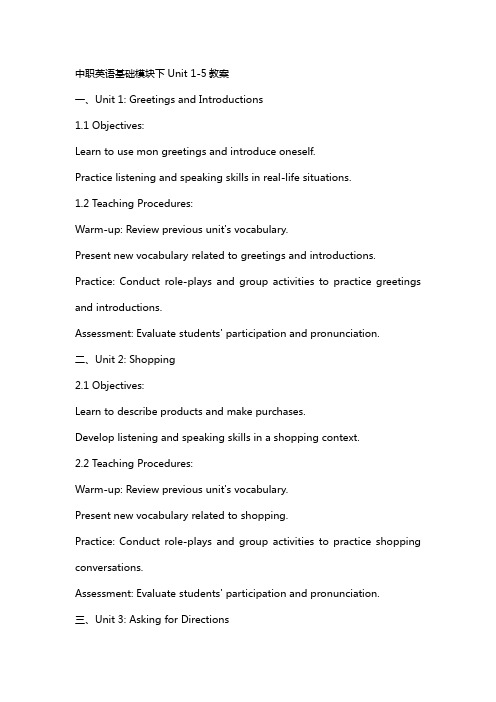
中职英语基础模块下Unit 1-5教案一、Unit 1: Greetings and Introductions1.1 Objectives:Learn to use mon greetings and introduce oneself.Practice listening and speaking skills in real-life situations.1.2 Teaching Procedures:Warm-up: Review previous unit's vocabulary.Present new vocabulary related to greetings and introductions. Practice: Conduct role-plays and group activities to practice greetings and introductions.Assessment: Evaluate students' participation and pronunciation.二、Unit 2: Shopping2.1 Objectives:Learn to describe products and make purchases.Develop listening and speaking skills in a shopping context.2.2 Teaching Procedures:Warm-up: Review previous unit's vocabulary.Present new vocabulary related to shopping.Practice: Conduct role-plays and group activities to practice shopping conversations.Assessment: Evaluate students' participation and pronunciation.三、Unit 3: Asking for Directions3.1 Objectives:Learn to ask for and give directions.Improve listening and speaking skills in a navigation context.3.2 Teaching Procedures:Warm-up: Review previous unit's vocabulary.Present new vocabulary related to asking for directions.Practice: Conduct role-plays and group activities to practice asking for directions.Assessment: Evaluate students' participation and pronunciation.四、Unit 4: Hobbies and Interests4.1 Objectives:Learn to describe hobbies and interests.Enhance listening and speaking skills in a leisure context.4.2 Teaching Procedures:Warm-up: Review previous unit's vocabulary.Present new vocabulary related to hobbies and interests.Practice: Conduct role-plays and group activities to practice describing hobbies and interests.Assessment: Evaluate students' participation and pronunciation.五、Unit 5: Family and Friends5.1 Objectives:Learn to describe family members and friends.Strengthen listening and speaking skills in a personal relationship context.5.2 Teaching Procedures:Warm-up: Review previous unit's vocabulary.Present new vocabulary related to family and friends.Practice: Conduct role-plays and group activities to practice describing family members and friends.Assessment: Evaluate students' participation and pronunciation.这只是一个初步的教案框架,您可以根据具体的教学需求和时间进行调整和补充。
语文版中职英语(基础模块-下册)Unit-1《Travel》2
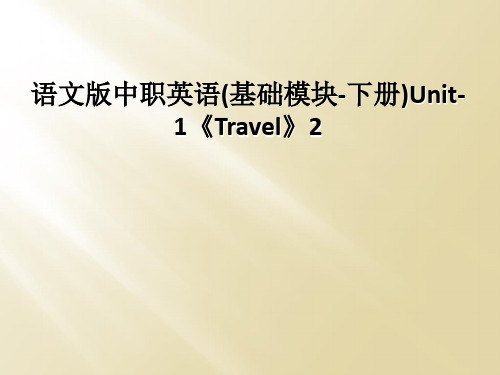
Moscow is the most northern city on Earth to have a population above 10,000,000, the most populous city on the continent of Europe, and the seventh largest city proper in the world.
• 2. Respect - Have respect for the cultures you are in. Be curious about how the people live, and don't be judge mental. Respect everyone for their unique contributions.
Moscow Red Square
Kremlin
Moscow is the capital, the most populous city, and the most populous federal subject of Russia. The city is a major political, economic, cultural, scientific, religious, financial, educational, and transportation centre of Russia and the continent.
• 5. Friends first, Money Later - Become friends with whoever you're doing business with. Even if you're just buying bread or sitting down to a meal. Being friendly and actively looking for friendship establishes yourself as a good persoRepublic of Tanzania: is a country in East Africa bordered by Kenya and Uganda to the north, Rwanda, Burundi, and the Democratic Republic of the Congo to the west, and Zambia, Malawi, and Mozambique to the south. The country's eastern borders lie on the Indian Ocean.
最新语文版中职英语基础模块 下册unit 9《advertisement》教案.doc

2
3. T:We all know the information a bout the advertisement by means of learning words “the first sentence of the text “ And then what is advertisement ? Let students to read the textand answer . And to find the key words of this pargragh.
And I can correct the pronunciation .
And we can read them together ,
And call other Ss to read to check if they can read skillfully.
15’
Teaching
ProTeaching
Topic
Unit 9 Advertisement
Type
New
Date
4.23
Period
Two
教学设计
Teachin 1. Target language words and sentences g goals 2. Target Ability
To develop the Ss’ ability and skills of guessing words and reading comprehension.
4
Game Rules
Teacher ‘s Activity
Ss’ activity
1. 1.greetings eacher other
Looking and talk about
语文版中职英语(基础模块下册)Unit9《Advertisement》教案(最新整理)
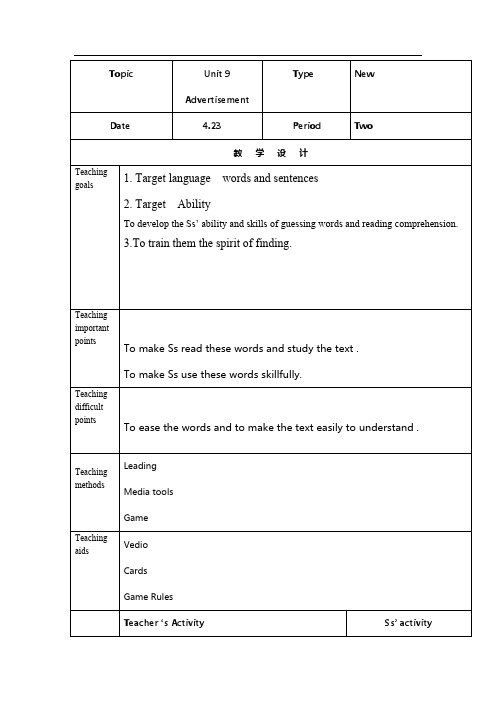
Topic Unit 9AdvertisementType NewDate 4.23Period Two教学设计Teachinggoals1. Target language words and sentences2. Target AbilityTo develop the Ss’ ability and skills of guessing words and reading comprehension.3.To train them the spirit of finding.TeachingimportantpointsTo make Ss read these words and study the text .To make Ss use these words skillfully.TeachingdifficultpointsTo ease the words and to make the text easily to understand .Teaching methods Leading Media tools GameTeachingaidsVedioCardsGame RulesTeacher ‘s Activity Ss’ activity3.T:We all know the information a bout theadvertisement by means of learning words “the firstsentence of the text “And then what is advertisement ?Let students to read the textand answer .And to find the key words of this pargragh.Thefollowing steps are similar to the first P4.SumText explanation/interpret 10marythekeywordsandGametimeTo announce them the rules of the game 5 (7’)Homew ork 1.wordsX 52.sentencesX5教学反思Positives : usede many kinds of tools to teach them ,and to shape a happy procedures ,And I so like the situation ,and everybody des,too. 5、关于坚持的名言,你既然期望辉煌伟大的一生,那么就应该从今天起,以毫不动摇的决心和坚定不移的信念,凭自己的智慧和毅力,去创造你和人类的快乐。
中职英语基础模块下unit全部教案

中职英语基础模块下Unit 1-5教案一、Unit 1:Greetings and Introductions1.1 教学目标能够用英语进行基本的问候和介绍。
能够听懂并使用常见的问候语和介绍词。
能够介绍自己的名字、年龄、职业等基本信息。
1.2 教学内容问候语和介绍词的用法。
自我介绍的模板和句型。
1.3 教学步骤导入:用中文进行简单的问候和介绍,引导学生用英语进行尝试。
新课内容:介绍问候语和介绍词的用法,如“Hello, my name is”和“I am years old”。
二、Unit 2:Family and Friends2.1 教学目标能够用英语描述家庭成员和朋友。
能够听懂并使用相关的词汇和句型。
能够用英语进行简单的家庭和朋友介绍。
2.2 教学内容家庭成员和朋友的词汇和用法。
描述家庭成员和朋友的句型和模板。
2.3 教学步骤导入:老师展示自己的家庭成员和朋友的照片,并用英语进行描述。
新课内容:介绍家庭成员和朋友的词汇和用法,如“mother, father, sister, friend”等。
实践环节:学生展示自己的家庭成员和朋友的照片,并用英语进行描述。
三、Unit 3:Food and Drink3.1 教学目标能够用英语描述食物和饮料。
能够听懂并使用相关的词汇和句型。
能够用英语进行简单的点餐和购物。
3.2 教学内容食物和饮料的词汇和用法。
描述食物和饮料的句型和模板。
3.3 教学步骤导入:老师展示一些食物和饮料的图片,并用英语进行描述。
新课内容:介绍食物和饮料的词汇和用法,如“apple, banana, milk, water”等。
实践环节:学生进行角色扮演,模拟点餐和购物的场景。
四、Unit 4:Jobs and Occupations4.1 教学目标能够用英语描述职业和工作。
能够听懂并使用相关的词汇和句型。
能够用英语进行简单的职业介绍和工作交流。
职业和工作的词汇和用法。
描述职业和工作的句型和模板。
中职英语语文版基础模块下册 Unit 4 The Information Age 单元课件(91张p
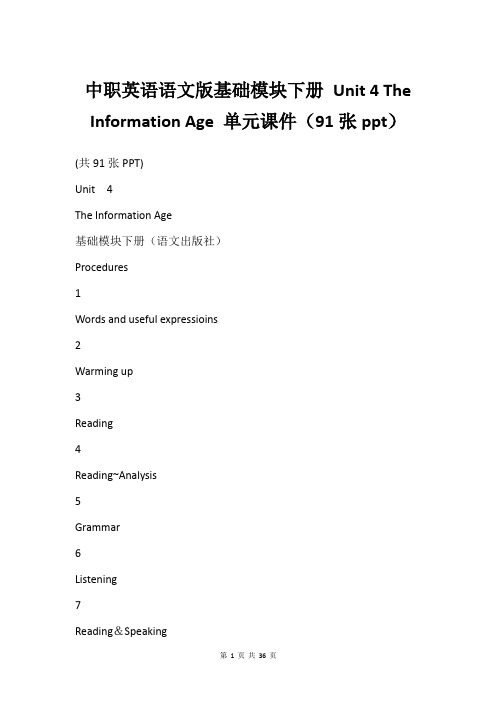
中职英语语文版基础模块下册Unit 4 The Information Age 单元课件(91张ppt)(共91张PPT)Unit 4The Information Age基础模块下册(语文出版社)Procedures1Words and useful expressioins2Warming up3Reading4Reading~Analysis5Grammar6Listening7Reading&Speaking8WritingWords and useful expressioins01单词短语精讲3.growth n.生长,发育v. (grow -grew -grown)1.science n.科学scientist 科学家2.strange adj.奇怪的stranger n.陌生人science and technology 科学技术grow up 长大e n.用处;v. 使用useful adj.有用的useless 无用的[ju:]make (good) use of 好好利用eg. We should make good use of our time.我们应该好好利用我们的时间。
eg.They spent two years(in) ______(build)this bridge.I spent two hours____ this maths problem.5. spend v.花费,度过(spent-spent)sb. spend ... (in) doing 做某事花费……sb. spend...on sth. 在某方面花费…….造这座桥花了他们两年时间。
这道数学题花了我两个小时。
buildingon辨析:spend;take;cost 花费cost “花费”,主语必须是物。
sth. cost (sb) some moneytake “花费,占用“sth. take sb. some time/some moneyIt takes sb, some time/some money to do sth.房子前面有个花园。
中职英语语文出版社基础模块下unit7单词课件

8.raise 提高,举起
--rise 上升
9.harmful 有害的--harm v./n.伤害 10.movement 运动,动作--move 移动 w 法律--lawyer 律师 12.successfully成功地--successful 成功的
• 烟民通常活得比不吸烟的人更短。在很多情况下,他们的去世是 由癌症导致的--肺癌或口腔癌。
live (1)过,活+adj./n. 如:Live a simple life is often the most valuable. (2)居住+介词+n. 如:His uncle lived in the heart of New York City.
where引导定语从句,先行词place,在从句中作地点状语
To stop smoking is not enough. Smokers should give up smoking as soon as possible.The habit of smoking can be successfully quit, as long as one has the determination to do so. 仅仅戒烟是不够的。吸烟者应该尽快戒烟。只要有决心,吸烟的习 惯是可以成功戒掉的。
对于某些人,吸烟已经成为一个日常习惯。他们认为吸烟使他们感 到开心且帮助他们放松。
help sb. do帮助某人做某事 =help sb. to do =help sb. with sth. 如:He helps his son (to) do the homework.
语文出版社中职教材英语基础模块下册Unit 5译文

Bill stayed away from school one hot day and went swimming. The headmaster wrote a note to Bill’s father and asked Bill’s brother Joe to take it home. Bill waited for Joe near the school gate, and walked home with him.
比尔在校门口等着乔并和他一起回 家。
“I suppose you’ve got a note for Father . Will you give it to him?” “I must, Bill. I promised the headmaster. He’s sure to ask me tomorrow.”
校长给比尔的父亲写了张便条并且 让比尔的弟弟乔把它带回家。
Unit 5 Whose Fault
Bill stayed away from school one hot day and went swimming. The headmaster wrote a note to Bill’s father and asked Bill’s brother Joe to take it home. Bill waited for Joe near the school gate, and walked home with him.
“I suppose you’ve got a note for Father . Will you give it to him?” “I must, Bill. I promised the headmaster. He’s sure to ask me tomorrow.”
